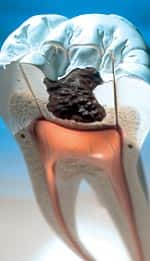Life Extension Magazine®
Q: My 14-year-old daughter has bleeding gums that are swollen and painful. She sees the dentist twice a year for regular checkups that include cleanings by a dental hygienist, but within a month of the cleaning, this problem returns. Is there anything that can be done for this condition? Therefore, your daughter’s problem is likely due to plaque-induced gingivitis that is exaggerated by her hormonal fluctuations. Stress, anxiety, and depression have been shown to have negative effects on the gingiva. Also, your daughter’s dentist should examine her mouth for oral lesions, herpes sores on the lips, and a fungal infection of the oral cavity called thrush, all of which can be associated with increased progesterone levels during women’s reproductive cycles. Nutrients and plant-derived remedies, applied topically to the gum tissues and taken internally, have been shown to reduce gingival inflammation, bleeding, plaque levels, and bacterial adhesion, and to increase gingival healing and fortification. Topical application of coenzyme Q10 may improve gingivitis in as little as a week. Tea tree oil (Melaleuca alternifolia) has antiseptic, fungicidal, and bactericidal effects, and has been effective in treating thrush and reducing both gingival inflammation and bleeding. Xylitol, a natural sweetener, can make plaque less adhesive and stimulate salivary flow. Hydrogen peroxide has antiseptic properties and can reduce plaque formation and gingivitis. Topical folic acid has been shown to be effective in the treatment of gingivitis. Topically applied lactoferrin powder can help resolve oral lesions, and may prevent the adhesion and growth of gingivitis-causing bacteria. Squalene has been shown to help enhance the body’s immune system. Life Extension Toothpaste provides these remedies in one convenient formula.
The antioxidant and anti- inflammatory ingredients in MistOral II™ spray would be helpful for your daughter’s problems. This mist spray can be used throughout the day. A multivitamin and mineral supplement can be very beneficial for your daughter’s oral and overall health. Finally, supplements that contain vitamin C and citrus bioflavonoids (such as rutin, hesperidin, and quercetin) have a beneficial effect on connective tissues and blood vessels, and may help strengthen the gum tissues. Your daughter may benefit from more frequent dental cleanings, perhaps even as often as every 60 days, until her condition resolves. Q: I am 53 years old and had not seen a dentist for two years before a recent visit last week. The dentist informed me that I have cavities on the root surfaces of my lower molar teeth on both sides. I take prescription medications for high blood pressure and depression. The dentist said that mouth dryness resulting from my medications may have predisposed me to tooth decay. Is there anything I can do to treat these cavities or prevent them in the future? A: Dry mouth, or xerostomia, is a condition that accompanies the use of certain systemic medications. People with dry mouth are at increased risk for developing dental cavities. Root surface cavities can occur when there is a loss of supporting bone around the necks of the teeth. The neck areas of the teeth are more prone to cavity development because the tooth structure there is much softer compared to the enamel that covers the exposed healthy tooth. Therefore, cavities at the root surface can progress much faster and have more severe consequences than enamel cavities. These consequences can include the need for root canal therapy or surgical extraction. The use of professional strength salivary substitutes and stimulants may be indicated to treat dry mouth. Dental fillings are required to eliminate root surface caries, and your dentist may also prescribe fluoride gels and oral rinses containing fluoride and chlorhexidine. Regular dental cleanings to prevent plaque build-up are another important aspect of maintaining dental health.
Consult with your prescribing physician for a medication review, and ask if your medications can be substituted with drugs that do not cause mouth dryness. Avoid candy, mints, and chewing gums that contain sugar. Although these products may alleviate dry mouth and stimulate salivary flow, sugar intake should be minimized to promote healthy teeth. Xylitol may be an especially helpful remedy for you. Although a natural sweetener, it is not fermentable by cavity-causing oral bacteria, so it does not contribute to tooth decay. In fact, studies have shown that xylitol helps decrease the incidence of cavities. Xylitol has been shown to help stimulate salivary flow. Thus, xylitol not only relieves dry mouth, but also helps clear bacteria and promote tooth remineralization. Xylitol is available in chewing gums and toothpaste, and xylitol powder can be used in food and beverages as an alternative to sugar. A complete approach to preventing the reoccurrence of tooth decay will include both nutritional and oral health strategies. Mouth care products such as Life Extension Toothpaste and Mist Oral II™ can be used to fortify your gums and reduce bacterial plaque accumulation. Nutritional supplements that contain vitamin C and citrus bioflavonoids promote healthy connective tissue and may help support bones and teeth. Calcium, magnesium, and trace minerals promote healthy bones throughout the body. By stopping the bone loss around your teeth, bacterial access to tooth root surfaces will be limited. This should help prevent further tooth decay. |



